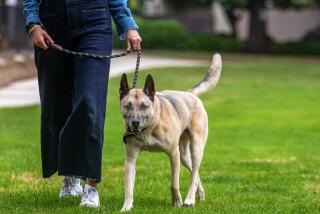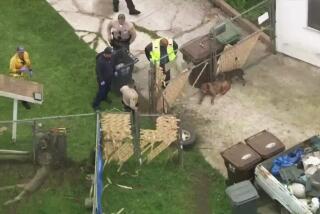In the Doghouse
- Share via
The pit bull: Menace to society or furry fall guy?
The fatal mauling last week of a toddler in South Los Angeles by one of two dogs acquired by the family for protection made headlines--and renewed cries for the banning or muzzling of pit bulls, as some countries already have done.
But are pit bulls a nasty, ferocious breed?
No, say a number of authorities, siding with pit bull owners who claim the breed is much maligned.
“I don’t think they’re inherently evil,” says Dr. Larry Hawk, the New York-based CEO and president of the American Society for the Prevention of Cruelty to Animals. But, he adds, “they have been bred over the years for their aggressive tendencies.”
Many people buy and train pit bills for protection.
“In the early ‘80s, you could hardly find [a pit bull],” notes Gini Barrett, Western regional director of the American Humane Assn. Today, she says, the number of pit bulls “is overwhelming.” She points to a survey showing that 40% to 45% of dogs in city shelters are pit bulls or pit bull mixes.
Radio personality Warren Eckstein notes that pit bulls also are a favorite of those who train dogs for fighting, an illegal sport in which there is big money.
“Because these dogs are so tough,” Barrett says, “even the defeated ones often live through their injuries. The horror is the losers wind up being dumped on the street as part of the population.”
Hawk says that having a badly trained pit bull in the home is “akin to having a stick of dynamite in your house with the fuse lit.” If you do buy a pit bull, experts say to be sure to buy from a reputable breeder, and be sure the dog has received appropriate training since birth.
Hawk also says protection is “the wrong reason to have a pit bull. The worst dog is the one left alone in the backyard with inadequate shelter, being hollered at, poked at, jabbed at. Someday he’s going to bite somebody, or worse.”
“The breed is OK,” says Jackie David, spokeswoman for the Los Angeles Department of Animal Services, “but leaving a child alone with any large dog is like leaving a child alone with a loaded gun.”
A dog, she says, “views its family as its pack” and children are at the bottom of the pecking order. “If the dog feels threatened by that child . . . the dog will respond accordingly.”
Are some pit bulls just born bad? No, says David, just as no babies are born bad.
“But if you’re neglected and abused, chances are you’re going to be pretty angry when you grow up,” she says. “It’s the same with an animal.”
*
Because people are breeding pit bulls as guard dogs in L.A., especially in high-crime areas, pit bulls do account for more dog attacks here than any other breed, David says, although her department has no statistics.
The pit bull’s bite also tends to be more severe, she adds, as “pit bulls have a very high threshold for pain” and will hang on despite efforts to separate them from their victims.
“Where the poodle might snap Jimmy’s finger,” Barrett says, “this dog will tear him apart.”
Dr. Robert LaBounty, a veterinarian in Studio City and an ear cropping specialist, says he believes pit bulls are responsible for more fatal attacks than any other breed (though fatal attacks are rare).
“Probably German shepherds have bitten more people,” LaBounty says, “but pit bulls killed more.”
Still, he says, “I like them. They can be good pets. Most of them are not people-aggressive. I have more trouble with some of the smaller breeds, like the miniature pinscher.”
Barrett does think “we need to reduce the population of pit bulls dramatically,” but not by banning the breed. “They can be wonderful dogs. I think irresponsible owners should be banned.”
Pit bulls have “so much to offer,” says Joan Bertsch of Lancaster, who owns five. Bertsch says she’s been a fan ever since she saw an irresistible puppy, Rex (who grew up to be a grand champion). She brought him home, warning her children: “ ‘The first time there’s anything wrong, he’s out of here.’ [But] he’s totally changed my mind about the breed.”
She takes two of her dogs with her each day to her book bindery in North Hollywood for company, not protection.
“Most of these dogs make horrible watch dogs,” she maintains. “A lot of them get stolen right out of their yards because they’re so friendly. . . . They’re just happy, happy dogs.”
Bridget Guy of Hollywood, who works in LaBounty’s clinic, says one of her three pit bulls is so docile that when attacked by Rottweilers and a Jack Russell terrier, “all she [did was] roll over on her back and say, ‘I’m sorry, I’m so sorry.’ I take her with me to my hairdresser and the owner says she’s better behaved than most of her clients.
“Their best quality is their biggest problem,” Guy adds. “They’re very loyal, and they’ll do whatever you want them to do, good or bad.”
*
Devotees of the breed point to pit bull heroes such as Stubby, the most decorated canine soldier of World War I, and mention that Helen Keller and Fred Astaire owned pit bulls.
The pit bull is a noble animal, these people say, descended from English dogs known for their courage and athleticism. The problem today, the devotees contend, is backyard breeders and “an anti-pit bull hysteria,” both resulting from the breed’s rising popularity.
Not to mention that underground fight culture. On the Internet a proponent, using a pseudonym, has posted a tribute to a dog named Mongoose, lauding him for the way he “would just grab a leg and sink his teeth into it until it broke, then he’d move to another leg.”
But Matthew Margolis, a dog trainer in West L.A. whose book on aggressive dogs, “Grrrrrrr!” (Little Brown), is due in September, says, “If pit bulls were [all] so terrible, every day somebody would be attacked and killed.”
There are about 4 million dog bites reported annually in the United States, he says, “and it’s not 4 million pit bulls.”
The pit bull gets the worst press, he says, because of those that wander in packs.
“They are unsocial, genetically defective animals, bred poorly.” And many who own pit bulls “are messed up. . . . [It’s] the dog of choice of gangs and drug dealers.”
Margolis adds: “I think the pit bull is wonderful. What’s not to like? It kisses you, hugs you. . . .”
Louis Colby of Newburyport, Mass., says he and his family are the oldest pit bull breeders in America, with a line started in 1889 (Louis’ father raised Petey, the pit bull that starred in the Our Gang films).
“A bad one can be bad,” he acknowledges. But he says he has owned thousands of the dogs, and “not a one of my children has ever been bitten.” Had that happened, the dog would have been out. “I like dogs, but I like children better. If you get a bad one, put him down.”
*
Mark Rotsten, an attorney in Encino whose entire practice consists of animal cases, says, “Pit bulls are one of the breeds that get in trouble a lot,” mainly because people “want to have a dog in the yard to kill somebody who comes into that yard.”
Just as a drunk driver who kills someone may be charged with manslaughter or second-degree murder, is it conceivable that charges could be brought against the owner of a pit bull that kills?
“It could happen,” Rotsten says.
Just as those adopting dogs from shelters must pay a deposit for spaying or neutering, Rotsten thinks there should be a mandatory fee for dog training--and mandatory pet school (like traffic school) for those who get in trouble.
Meanwhile, things to remember: An unneutered pit bull is three times more likely to bite than a neutered one. Pit bulls should be properly confined. And all dogs should be trained in what Barrett calls “a kindly manner.”
More to Read
Sign up for Essential California
The most important California stories and recommendations in your inbox every morning.
You may occasionally receive promotional content from the Los Angeles Times.













